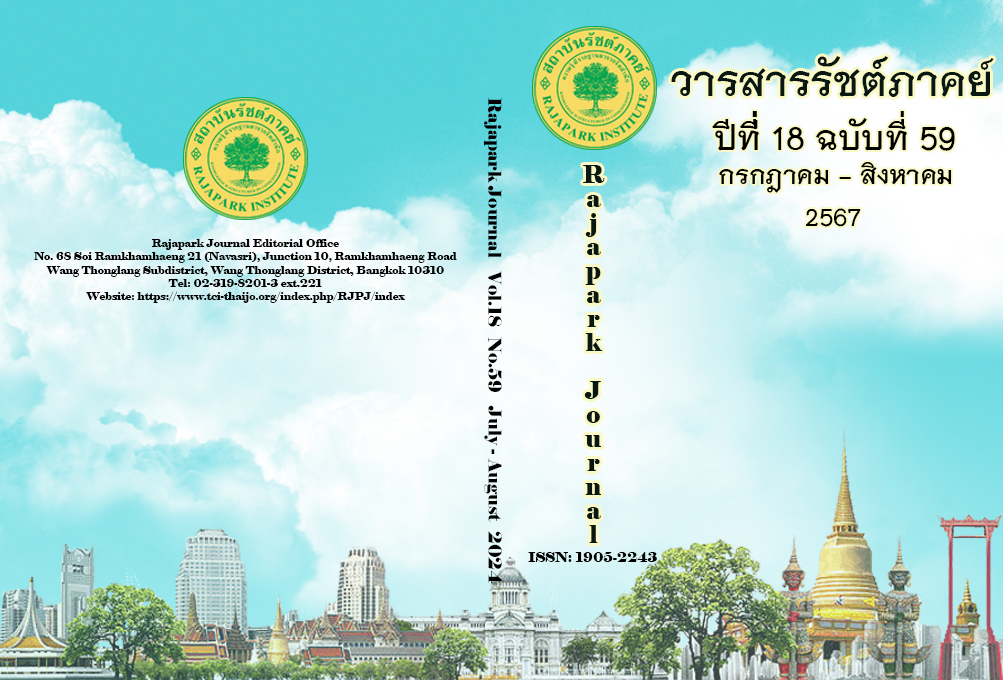Professional Accounting Skills in the Digital Age and the Quality of Financial Reports of Accountants in the Hotel Business Nakhon Sawan Province
Main Article Content
Abstract
The purpose of this study is 1) to study the relationship between professional accounting skills in the digital age and the quality of financial reports of hotel business accountants in Nakhon Sawan Province. 2) To study the qualitative characteristics of financial reports and apply them to hotel business operations in Nakhon Sawan Province. 3) In conclusion from the survey of professional accounting skills in the era, digital improved the quality of financial reports of hotel businesses in Nakhon Sawan Province to be of higher quality. The sample group used in the research was 136 accountants and hotel business executives in Nakhon Sawan Province. The tool used to collect data was a questionnaire. Statistics used to analyze the data included percentages, mean, standard deviations, correlation analysis, and simple regression analysis for hypothesis testing. The results showed that 1) accounting professional skills in the digital age and the quality of financial reports of hotel business accountants in Nakhon Sawan province were in the same direction with a significance level of 0.01. 2) Basic qualitative characteristics were at a high level of overall quality characteristics. 3) Professional accounting skills in the digital age have a significant direction with a significance level of 0.01. Society will receive guidelines for developing the professional skills of accountants, which should be driven by technological innovation, lead to the application of a successful hotel business, and provide a new theoretical framework beneficial to the accounting profession.
Article Details

This work is licensed under a Creative Commons Attribution-NonCommercial-NoDerivatives 4.0 International License.
Views and opinions appearing in the Journal it is the responsibility of the author of the article, and does not constitute the view and responsibility of the editorial team.
References
Aaker, D. A., Kumar, V., & Day, S. (2001). Marketing research (7th ed.). Wiley.
Bunwut, S., & Inthakhan, P. (2016), A study of the characteristics of students. Modern accounting under the ASEAN economic community. Journal of Management Science, 9(1), 167-177. http://www.mgts.lpru.ac.th/journal/index.php/mgts/article/view/279
Bini, L., Bellucci, M., & Giunta, F. (2018). Integrating sustainability in business model disclosure: Evidence from the UK mining industry. Journal of Cleaner Production, 171, 1161-1170.
CGMA: Chartered Global Management Accountant. (2019). CIMA’s CGMA competency framework: a framework for success.
https://www.aicpa-cima.com/resources/landing/cimas-cgma-competency-framework-a-framework-for-success
Creswell, J. W., & Plano-Clark, V. L. (2007). Designing and conducting mixed methods research. SAGE.
Federation of Accounting Professions. (2015). International Education Standards for Professional Accountants and Revised Edition 2015. Federation of Accounting Professions.
Goretzki, L., & Messner, M. (2019). Backstage and frontstage interactions in management accountants’ identity work accounting. Organizations and Society, 74, 1–20. https://doi.org/10.1016/j.aos.2018.09.001
Kawin, D. (2020). Factor analysis of ethical for professionals accountants of federation of accounting professions B.E. 2561 in the view of professions of accountants[Master’s thesis, Dhurakij Pundit University].
Khongsano, P. (2019). The adjustment of the Thai economic structure into Thailand 4.0. www.parliament.go.th
Lawson, R.A., Blocher, E.J., Brewer, P.C., Morris, J.T., Stocks, K.D., Sorensen, J.E., Stout, D.E., & Wouters, M.J.F. (2015). Thoughts on competency integration in accounting education. American Accounting Association, Issues in Accounting Education, 30(3).
DOI: 10.2308/iace-51021
Metjiranont, T. (2019). Trends in the accounting profession in 2019. https://www.dharmniti.co.th/acc-knowledge-acctrend in 2020
Quattrone, P. (2016). Management accounting goes digital: Will the move make it wiser?. Management Accounting Research, 31, 118–122. https://doi.org/10.1016/j.mar.2016.01.003
Shanker, R., Bhanugopan, R., van der Heijden, B. I. J. M., & Farrell, M. (2017). Organizational climate for innovation and organizational performance: The mediating effect of innovative work behavior. Journal of Vocational Behavior, 100, 67–77.
https://doi.org/10.1016/j.jvb.2017.02.004
Soin, K., & Collier, P. (2013). Risk and risk management in management accounting and control. Management Accounting Research, 24(2), 82-87. https://doi.org/10.1016/j.mar.2013.04.003
Srisa-ard, B. (2011). Introduction to research (9th ed.). Suwiriyasarn.
Srisathitnarakun, B. (2012). Development and quality checking of research tools: Psychological measurement properties. Chulalongkorn University Press.
Wand, Y., & Wang, R. Y. (1996). Anchoring data quality dimensions in ontological foundations. Association for computing machinery. Communications of the ACM, 39(11), 86-95.
Xu, H., Nord, J. H., Nord, G. D., & Lin, B. (2003). Key issues of accounting information quality management: Australian case studies. Industrial Management & Data Systems, 103(7), 461-470.


